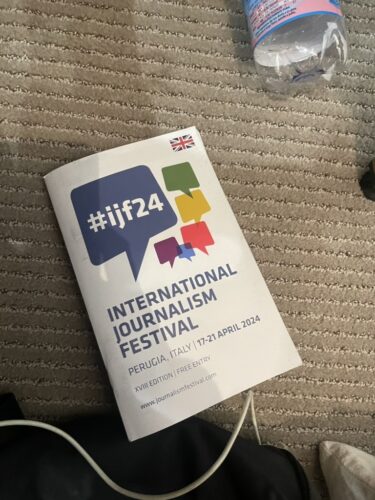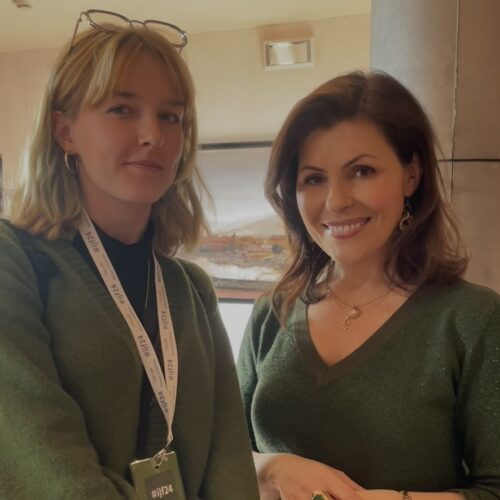Being the first non-native English speaker to present a primetime news programme on British television, Barbara Serra has paved the way for other bilingual reporters. Alice met Barbara Serra at the International Journalism Festival (IJF) 2024 in Perugia, Italy, where Barbara shared insights about her career and advice for aspiring bilingual journalists.
If you’re multi-national, bilingual, or living abroad, you’ll understand the familiar stomach-churning feeling of not fitting in completely. You may worry that your accent, cultural or social differences could set you back. You could end up questioning your place in that country. Do you deserve to be there?
Barbara Serra is here to tell you, of course you do. Growing up speaking Italian and living in Denmark, her cultural and linguistic background meant a tough assimilation process in the UK, especially within the TV news industry. Then, she appeared on BBC London and debuted her successful presenting career as the first non-native English-speaking presenter on a British primetime news programme.
We attended one of her conferences at the International Journalism Festival in Perugia and found out exactly what she recommends to aspiring bilingual journalists seeking a career in presenting. We’ve included the answers to our favourite questions, just for you.
“What can people do to follow your path?”
Serra answered this by pulling out a jewellery box and whipping out what she calls a ‘bone piece’. It’s a sort of jaw trainer that works out your tongue so you can enunciate your words more clearly and focus on diction clarity, hence be more “native” sounding. She goes on to explain that as much as she wishes there was some secret hack to making it in the British industry as a foreign journalist, “the only honest reply is: ‘Can you pass as a native speaker?’”
After explaining how she was trained and briefed into sounding and acting British, she admits that the most important part of succeeding is listening to criticism. With that being said, you need to assert yourself and second-guess the initial feedback you receive. If you’re being told that “you sound fine,” push further and find out how you can improve. It takes a lot of courage to hear negative comments, internalise them, and improve yourself, so she adds, “I’m sorry they’re mean, but we’ll get over it.”

“What would you say the term ‘native speaker’ means?”
It’s no longer easy to tell who a “native speaker” is, considering the multitudes of dialects and accents that are out there. Not to mention some of the diabolical spelling and pronunciation (by English natives) that is making its rounds in corners of the internet.
“Native speakers get away with murder [linguistically], we can’t afford to do that.”
Serra says there’s an easy way to tell if you’re a native English speaker or not: do you remember a time when you couldn’t speak English? If that’s a yes, you’re not a native speaker. According to her, other people can also “kind of” hear it in your voice; we all have good English days, and some bad English days – try not to worry about either one too much.
“What is the right path for Russian journalists in exile?”
The Russian journalist goes on to explain that while he is in exile, he has heard two contrasting opinions on how he should be working, and he now feels stuck. Half say he should be writing in Russian for Russia, and the rest believe he should be writing in English to reach a wider audience with the topic of Russian affairs.

“If you’re bilingual: milk it!”
There’s a round of laughter from the room, but Serra instantly cuts in by asking why he doesn’t do both. Having different languages means different voices, audiences, and (ultimately) impacts. Double the output also means double the opportunities.
If Serra’s story and words resonate with you, we’d recommend subscribing to her newsletter, News With a Foreign Accent, and keeping up with her socials. Her new book will also be out soon – keep your eyes peeled!





